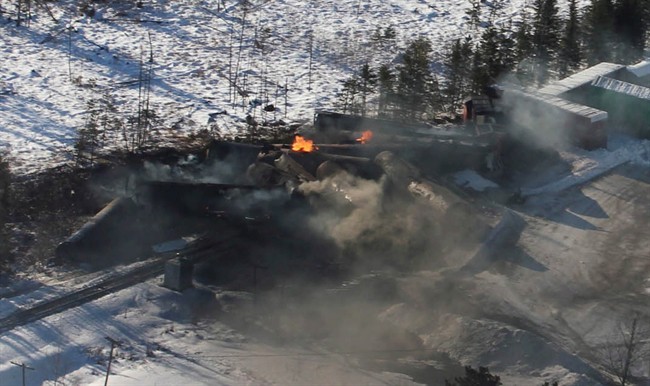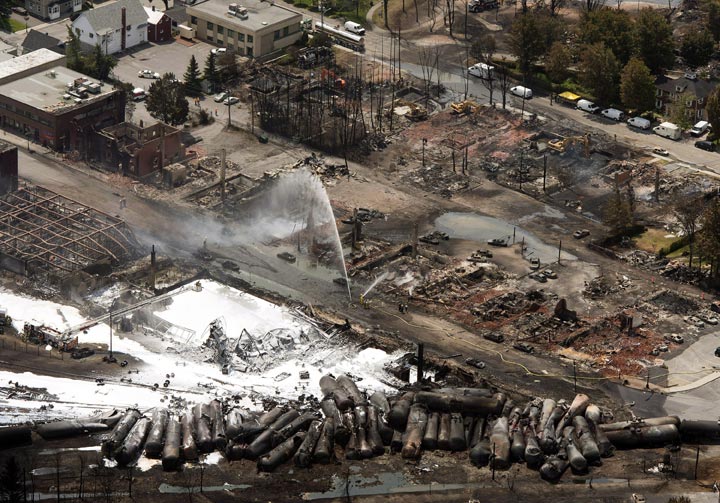TORONTO – Amid smouldering cars of a train that derailed Wednesday in New Brunswick and after a devastating explosion in Lac-Megantic, Que. left 47 people dead, the federal government has repeatedly said safety is its top priority.

But it still hasn’t acted on recommendations from years ago, Global News has learned. And it doesn’t consistently track the amount of oil being shipped in ever-greater amounts across the country.
“If only the wheels of the railroads turned as slowly as the wheels of Transport Canada,” said 30-year-old rail veteran Dan Christie, who has worked at CN Rail, Ontario’s Metrolinx and VIA Rail.
“Transport Canada is very, very slow to react to these situations.”
A November auditor-general’s report made 11 recommendations to Transport Canada related to oversight of rail safety after finding “significant weaknesses.”
When Global News asked for a status report on each of the 11 improvements, Transport Canada said Thursday it’s “still working on implementing the recommendations made by the Auditor-General report.”
Auditor-General Michael Ferguson pointed out that while Transport Canada has identified which skills its inspectors should have, it has not determined whether its current roster of inspectors has them.
Other safety issues identified in the report were grade crossings – such as the Ottawa site of a fatal bus-train collision– collecting data on safety performance and implementing and overseeing safety management systems.
READ MORE: Crude awakening: a Global News series on oil
A December 2011 audit from the federal environment commissioner – including concerns Transport Canada committed to addressing – still has three outstanding commitments.
That includes clarifying roles and responsibilities of Transport Canada employees involved in inspecting dangerous goods. Originally slated for June 2012, it’s now “on track” for June 2014, the department said in a July email.
Then-Environment Commissioner Scott Vaughan cautioned that public safety is increasingly at risk because of a failure on the government’s part to provide and enforce sufficient oversight of transporting dangerous goods — including oil — by road, rail, air and ship.
WATCH: Mulcair wants government to oversee inspection of rail industry
Even at the time of the commissioner’s 2011 report, the faults he identified were old news.
“Many of the weaknesses we found in Transport Canada were identified more than five years ago and have yet to be fixed,” he wrote at the time.
Transport Canada announced last month they were looking to launch a risk analysis of dangerous goods transport by rail, road, sea and air.
But first Transport Canada needed a company to lay the groundwork for the program and opened a contract for bidding in December.
READ MORE: Crude oil spills are bigger from trains than pipelines
The number of proposals submitted is “unknown at this time,” according to an email from the department on Thursday. The request for proposals closes in four days.
Christie believes more derailments are occurring because there’s more traffic being handled by the railways, and maintenance that hasn’t kept up with “modern, heavier trains.”
“Transport Canada has almost an ingrained policy of closing the barn door after the horse has left,” he said. “We’re seeing a reactive policy on the part of Transport Canada to try and catch up with the railways themselves.”
Watch below: Renewed concerns about transporting crude oil. Vassy Kapelos reports Jan. 8.
On Thursday, Transport Canada sent a list of the government’s “actions on rail safety” prior to the November auditor-general’s report:
• “Between April 1, 2012 and March 31, 2013 Transport Canada conducted more than 30 000 inspections
• Invested more than $100 million in our rail safety system
• Continued to hire more inspectors
• Increased fines for companies found to break our regulations
• Created whistleblower protection for employees who raise safety concerns
• Required each railway to have an executive legally responsible for safety”
But when it comes to adding more inspectors, Christie said it’s not a matter of going on a hiring spree.
“It means actual people with the technical knowledge of how trains operate, getting up in the cabs of those engines, looking at rail traffic controllers panels, how orders are dispatched, how trains are put together, all of that sort of things by people with the correct expertise,” he said.
“In my experience, it was the wrong people in the wrong jobs.”
Transport Canada couldn’t say Thursday whether any whistleblowers had come forward with safety concerns since the protections were put in place.
Since the Lac-Megantic derailment, the department said it began “requiring all rail operators to further enhance the safety of existing railway operations and the security of railway transportation,” by
• “requiring railways to develop rules in this regard for the longer term
• requiring any person who imports or offers for transport crude oil to conduct classification testing if the current test was not performed since July 7, 2013, and
• requiring rail companies to share information with municipalities, which will further support municipal emergency planners and first responders.”
Transport Canada didn’t offer any other specifics on how rail safety was “further enhanced” by publication time, but quietly approved new safety rules on Dec. 26 that were part of an emergency directive prompted by the Lac-Megantic explosion.
The measures require at least two crew members to work trains that carry dangerous goods and said no locomotive attached to one or more loaded tank cars transporting dangerous materials could be left unattended on a main track.
Transport Canada also reissued a new emergency directive on Jan. 1 covering rail companies that are not part of the Railway Association of Canada.
Christie said Transport Canada isn’t prepared for the increase in the transport of crude oil by rail that Canada has seen in the past few years.
“If they had been prepared, these derailments wouldn’t be happening.”
With files from Amy Minsky and Leslie Young and The Canadian Press



Comments